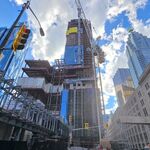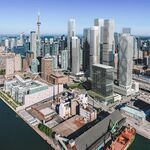Yes. While the cities budget might increase about 3-4% a year per capita, the value of property has been increasing faster.
As far as I know, older properties and newer properties are currently treated the same way. Everything currently based on the prorated value of the property between January 1st 2005 and January 1st 2008. For 2012 taxes, everyone will pay taxes based on their January 1st 2008 assessment value; for 2011 taxes it's 75% of the January 1st 2008 value, and 25% of the January 1st 2005 value. As far as I know, the shift for older properties having their assessment shifted to new values occurred in the mid-1990s ... that process is long-since over.
So is the difference in residential tax rates! Toronto's residential rate is 0.562% not including the province-wide education rate of 0.231% -
while Oshawa's is 1.42% while Toronto's commercial rate is 1.83% with it being 2.07% in Oshawa.
Thanks nfitz !
I think there's a special program Toronto has in place for the older building on top of the normal 5 year CVA increase (i.e. if your property is now valued at 1.5X the previous price, this is brought in over 5 years or so).
Regarding the residential rates, I think your off a little:
Toronto Residential: 0.7929218%
Mississauga Residential: 0.962611%
So only about 1.2X. Markham and the like are similar.
Vaughan and Markham are similar. I know some other suburbs are more i.e. Brampton is about 1.2% and the example you gave.
But generally speaking the main competition for office space is in Mississauga, Vaughan, and Markham.
Over the last 5 years we've seen a turn around in the core in terms of development but not the rest of the city, and not really as much as other cities have.
That's hard for some people to believe ! i.e. we see all these offices towers going up, but in many US cities, they've had millions of square feet coming online in their cores on a yearly basis for the last while (not the last couple of years of obsious reasons ...).
So our suburbs are, for whatever reason, much more attractive then there American counterparts. To a certain degree this makes sense, look at MCC ! But on the other hand very little development takes place in MCC, mainly the outlying areas. Markham has amazing growth plans, maybe that's fueling them. So compound this with the tax differential, which from the research I've done is UNIQUE i.e. a lot of other cities of higher or lower tax rates ... that's fine ... but tax rates in the city core and suburbs are usually VERY SIMILAR ! Commercial rates in particular.




